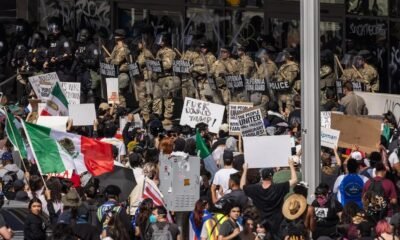border
Trump Triggers 'Border Emergency' to Abolish Birthright Citizenship

On Monday, following his inauguration as the 47th president, Donald Trump signed a series of executive orders aimed at tightening immigration policies at the U.S.-Mexico border.
Key among these was a declaration of a national emergency. This move will enable the deployment of armed forces and the construction of physical barriers along the border. A Trump official indicated that the Secretary of Defense is directed to send additional personnel, including armed forces and National Guard members, to manage the crisis.
South Dakota Governor Kristi Noem, who is poised to oversee Trump’s immigration policies, completed her confirmation hearing last week. She is expected to receive a vote in the Senate shortly. Trump’s choice for defense secretary, Pete Hegseth, faced intense scrutiny during his confirmation but is anticipated to be approved by Republican senators.
The national emergency executive order also mandates a report within 90 days from the Department of Defense and Department of Homeland Security regarding conditions at the border. It includes an exploration of necessary actions, potentially invoking the Insurrection Act of 1807, which allows military intervention in domestic disturbances.
Additionally, Trump’s orders halted various legal immigration processes, notably the termination of humanitarian parole programs for nationals from Cuba, Haiti, Nicaragua, and Venezuela. The previously used CBP One app for migrants to secure asylum appointments was also discontinued just an hour after Trump took office. The American Civil Liberties Union (ACLU) has since filed a lawsuit challenging this decision.
Furthermore, the executive orders reinstated the “Remain in Mexico” policy, which requires asylum seekers to wait in Mexico under potentially unsafe conditions while their cases are adjudicated. The orders also abolished the “catch and release” practice, ensuring that detained migrants cannot reside in U.S. communities during their legal proceedings.
The military’s role in defending U.S. territory will be clarified as well, with an emphasis on border security. According to officials, the military will be tasked with strategic planning to address various challenges, including illegal migration, drug trafficking, and human smuggling.
Trump also reissued policies aimed at the removal of undocumented immigrants, counteracting measures put in place by the Biden administration in 2021.
Plans to end asylum provisions, which contradict existing U.S. law, may face immediate legal pushback. An official confirmed that the administration does not recognize automatic birthright citizenship for children of undocumented immigrants, a position that could lead to further legal challenges.
In a move to combat drug cartels, the administration designated these groups as global terrorists. Trump also announced a four-month suspension of refugee resettlement operations starting January 27. This affects the U.S. Office of Refugee Resettlement, which had assisted over 100,000 refugees in the last fiscal year.
Furthermore, the administration plans to pursue capital punishment for severe crimes committed by undocumented individuals, emphasizing a commitment to public safety and victim support.


















